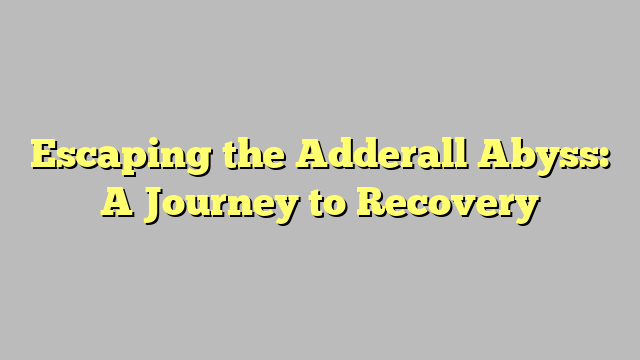In today’s fast-paced and demanding world, many turn to Adderall for that extra boost of focus and productivity. What starts as a seemingly harmless aid can quickly spiral into a full-blown addiction, trapping individuals in a cycle of dependency and escalating doses. The allure of enhanced performance can overshadow the detrimental effects Adderall addiction can have on one’s physical and mental well-being. Embarking on the journey to recovery from Adderall addiction can be daunting, but it is a path filled with hope and the promise of reclaiming a life free from the grips of dependency.
Recognizing the Signs of Adderall Addiction
It’s important to pay attention to changes in behavior and physical appearance that could indicate the presence of an Adderall addiction. Isolating oneself, experiencing sudden weight loss, or showing signs of excessive energy are common red flags. In some cases, individuals may become defensive or secretive about their Adderall use, which can be another warning sign.
Furthermore, disruptions in sleep patterns, such as insomnia or irregular sleeping habits, may point towards an Adderall addiction. Additionally, neglecting responsibilities or withdrawal from activities that were once enjoyed can be indicative of a deeper issue. It’s crucial to keep an eye out for these signs both in oneself and in loved ones who may be struggling with Adderall addiction.
If a person exhibits a significant increase in tolerance to Adderall or has difficulty functioning without it, they may have developed a dependency on the drug. This can lead to escalating doses to achieve the desired effects, further perpetuating the cycle of addiction. Seeking help and support from professionals is essential in addressing the root causes of Adderall addiction and working towards lasting recovery.
Strategies for Overcoming Adderall Dependence
Creating a structured routine can help in reducing reliance on Adderall. Setting specific times for daily activities and sticking to them can promote natural energy levels throughout the day, reducing the perceived need for the drug. Incorporating regular exercise and adequate sleep into this routine can also boost overall well-being and reduce the desire for Adderall.
Seeking support from a therapist or counselor can be a valuable resource in overcoming Adderall dependence. Therapy can provide a safe space to address underlying issues that may have led to the addiction. It can also help develop coping mechanisms and alternative strategies for managing stress and enhancing focus without the use of Adderall.
Gradual tapering off Adderall under the guidance of a healthcare professional is a common strategy for overcoming dependence. Slowly reducing the dosage allows the body to adjust gradually, minimizing withdrawal symptoms and increasing the likelihood of long-term success. Healthcare providers can provide personalized guidance and support throughout this process.
Seeking Professional Help for Recovery
It is essential to seek professional guidance when facing adderall addiction. Trained therapists and counselors can provide valuable support and strategies for overcoming this challenging situation.
https://ashevillerecoverycenter.com/is-adderall-addictive/
Therapy sessions offer a safe space to explore the underlying reasons for adderall abuse and help individuals develop healthier coping mechanisms. Through personalized treatment plans, individuals can address addictive behaviors and work towards sustainable recovery.
Additionally, seeking medical help is crucial in managing withdrawal symptoms and potential health complications associated with adderall addiction. A healthcare provider can offer appropriate interventions and monitoring to ensure a safe and effective recovery journey.






Recent Comments